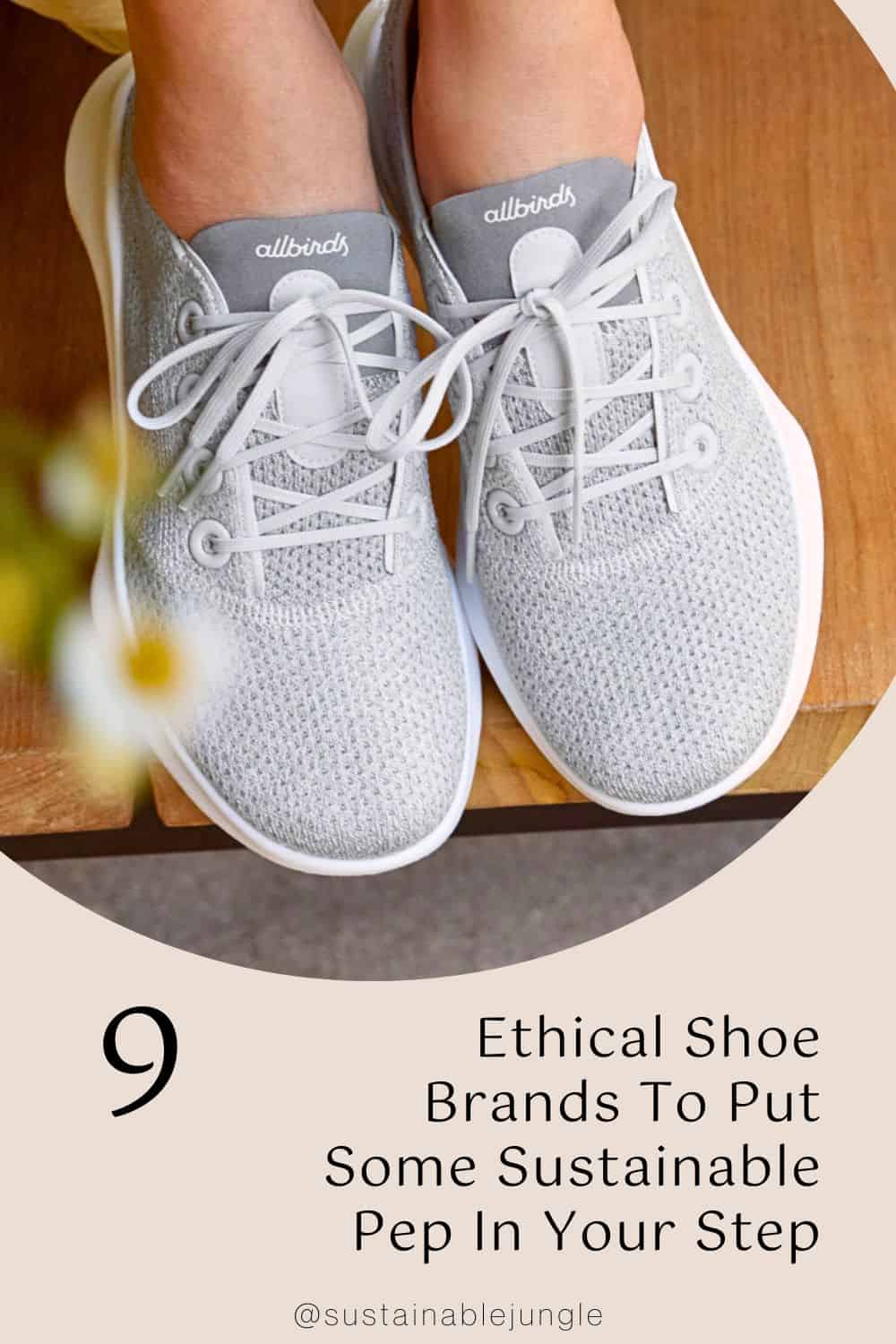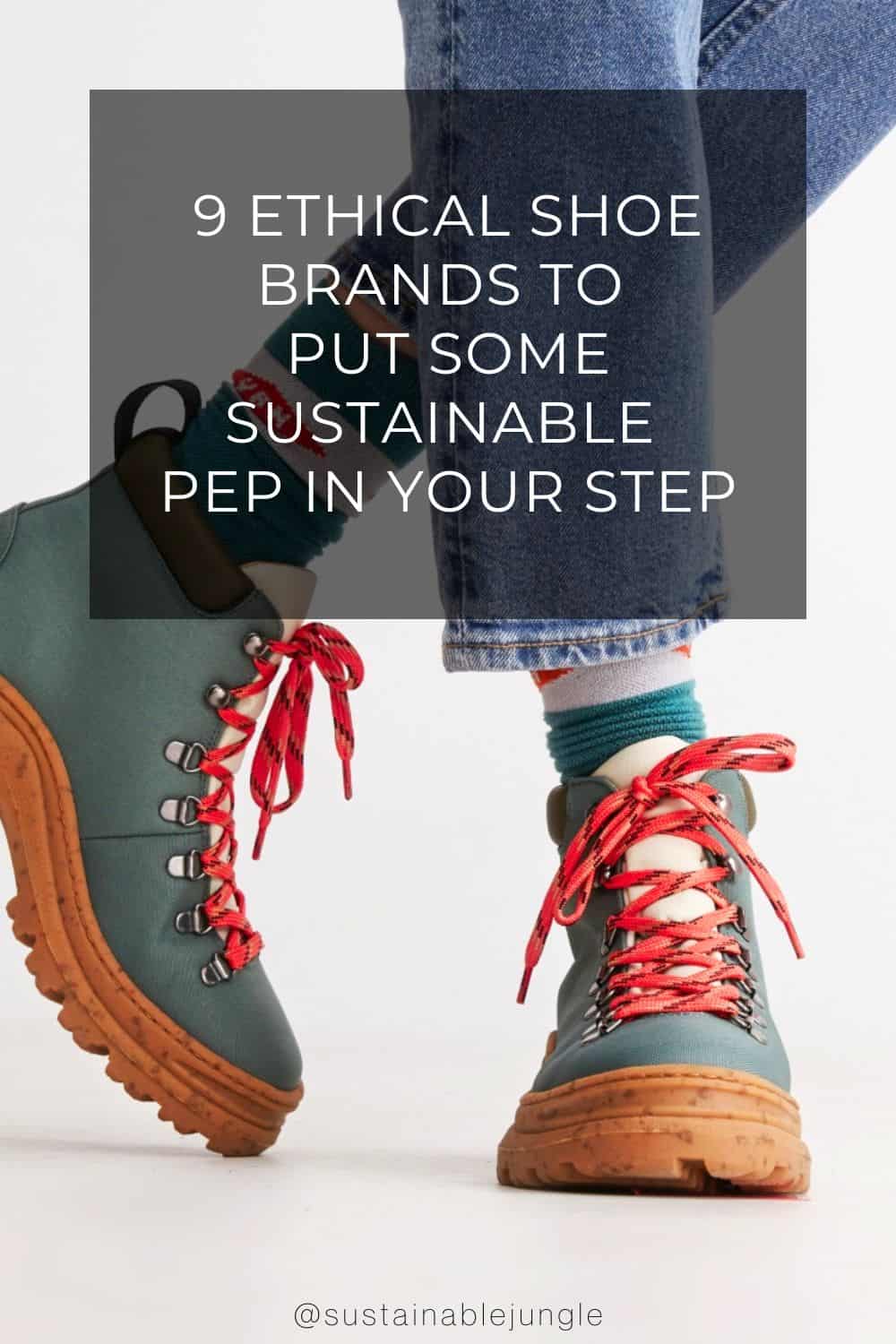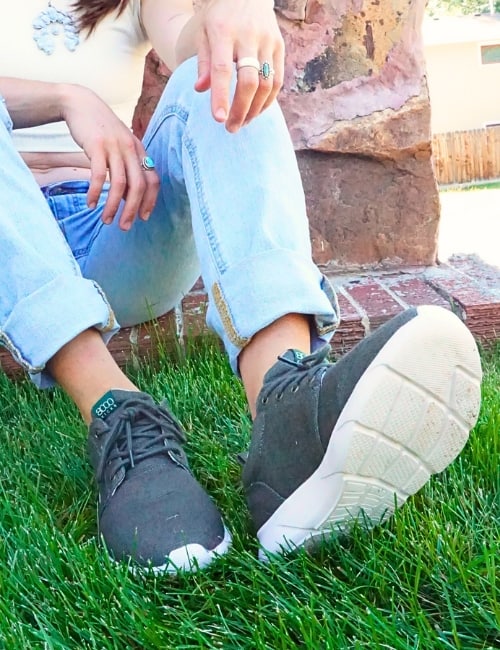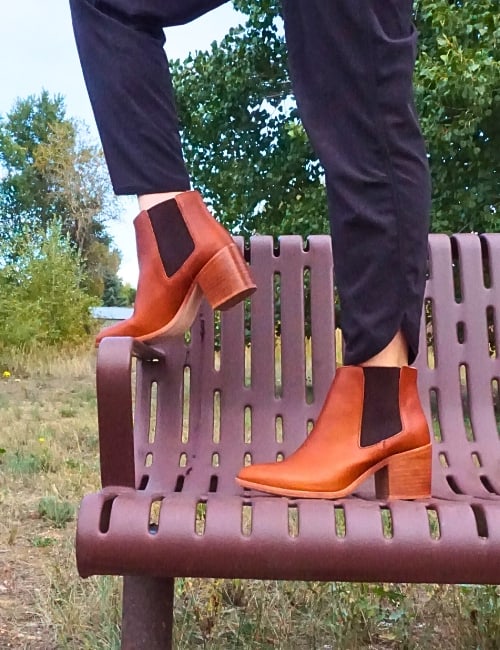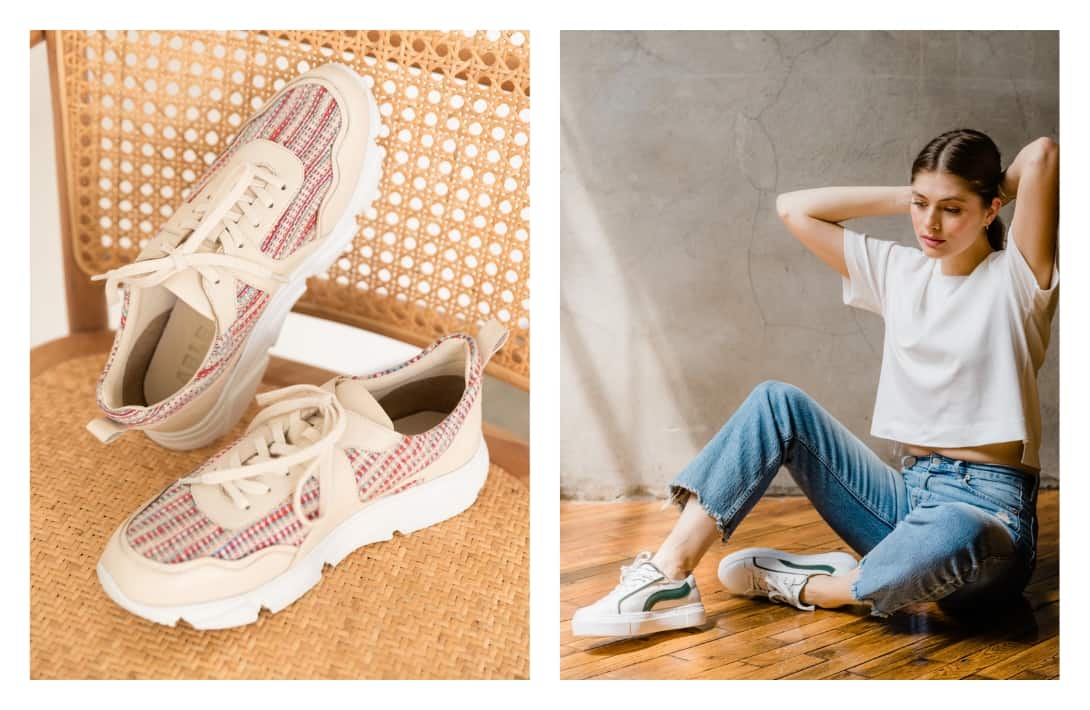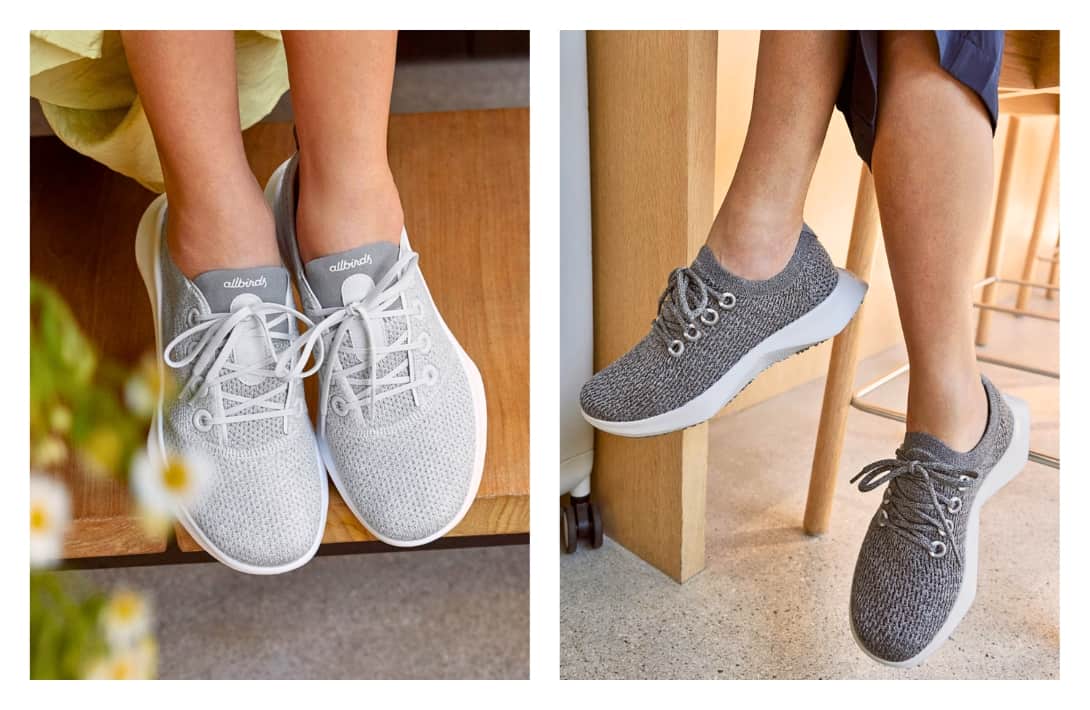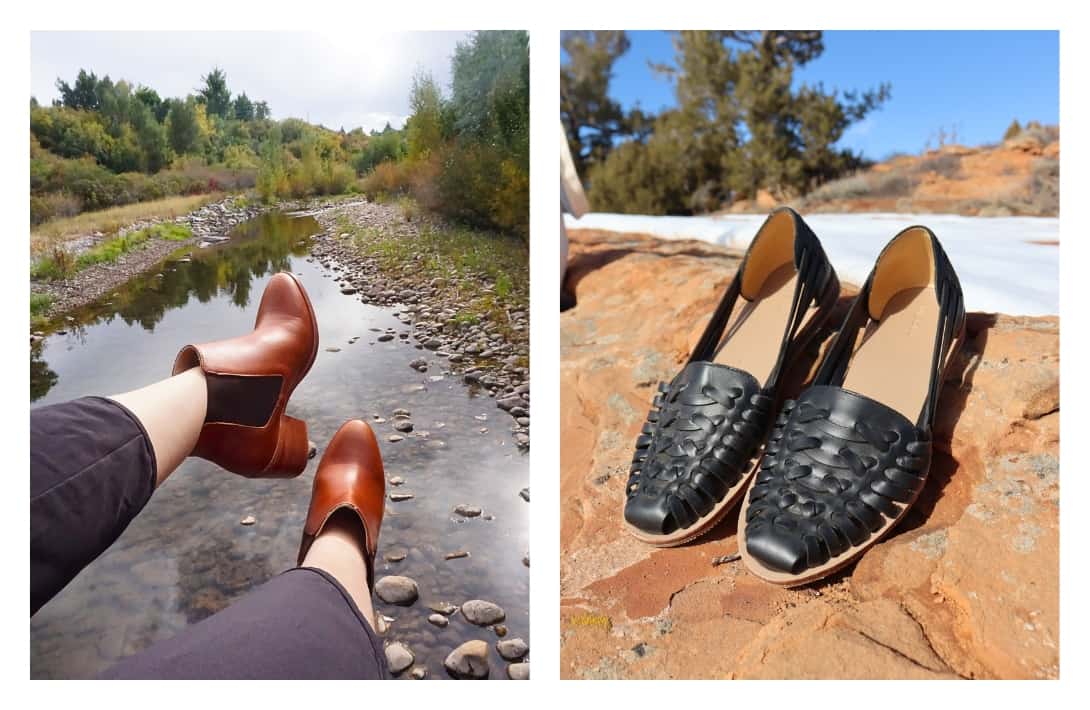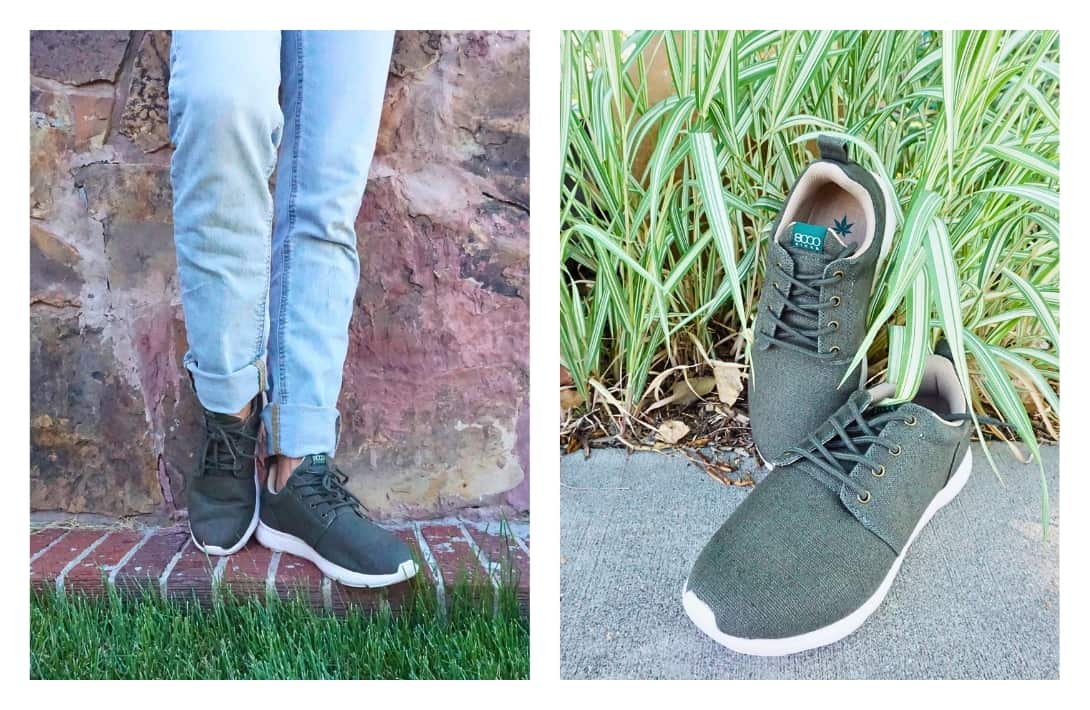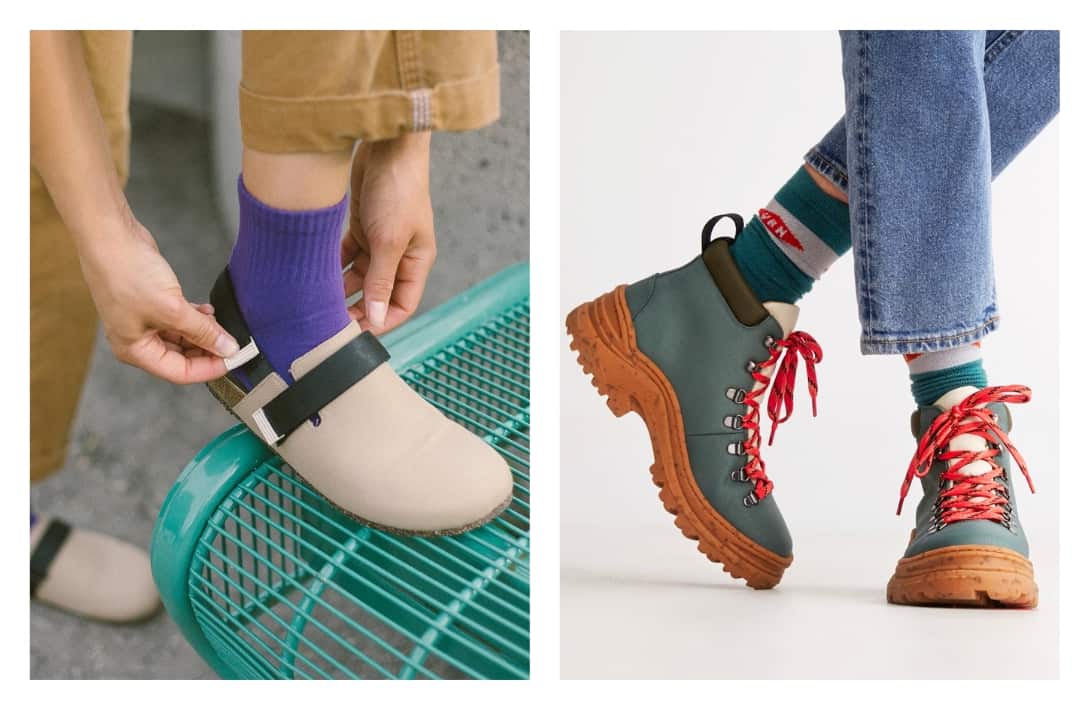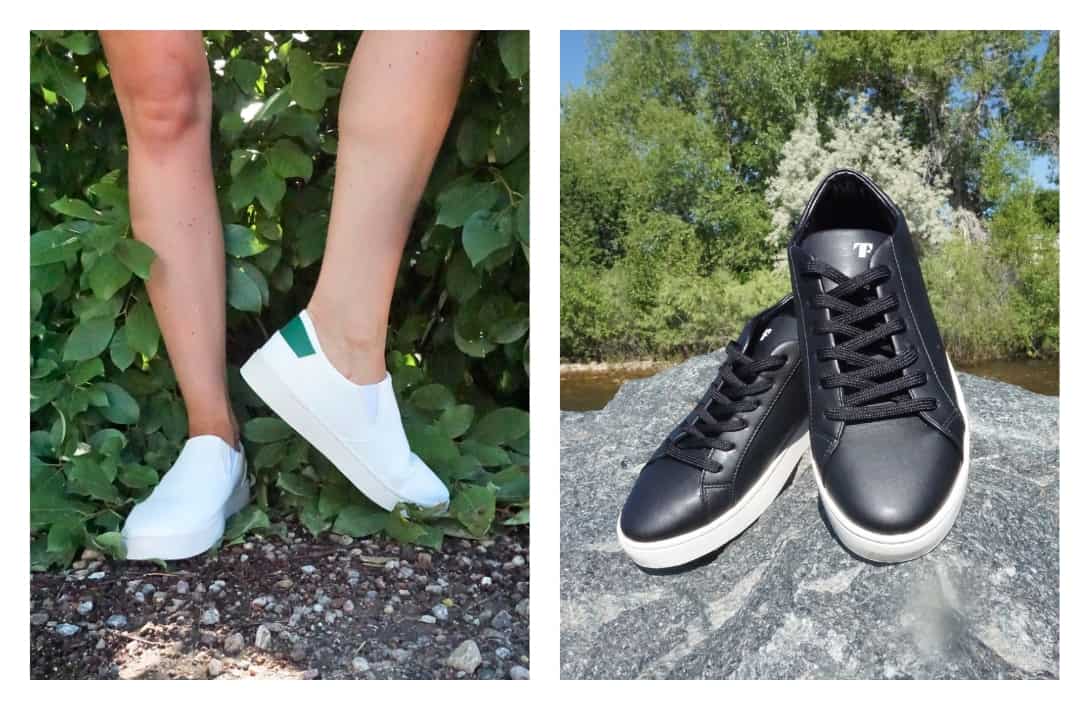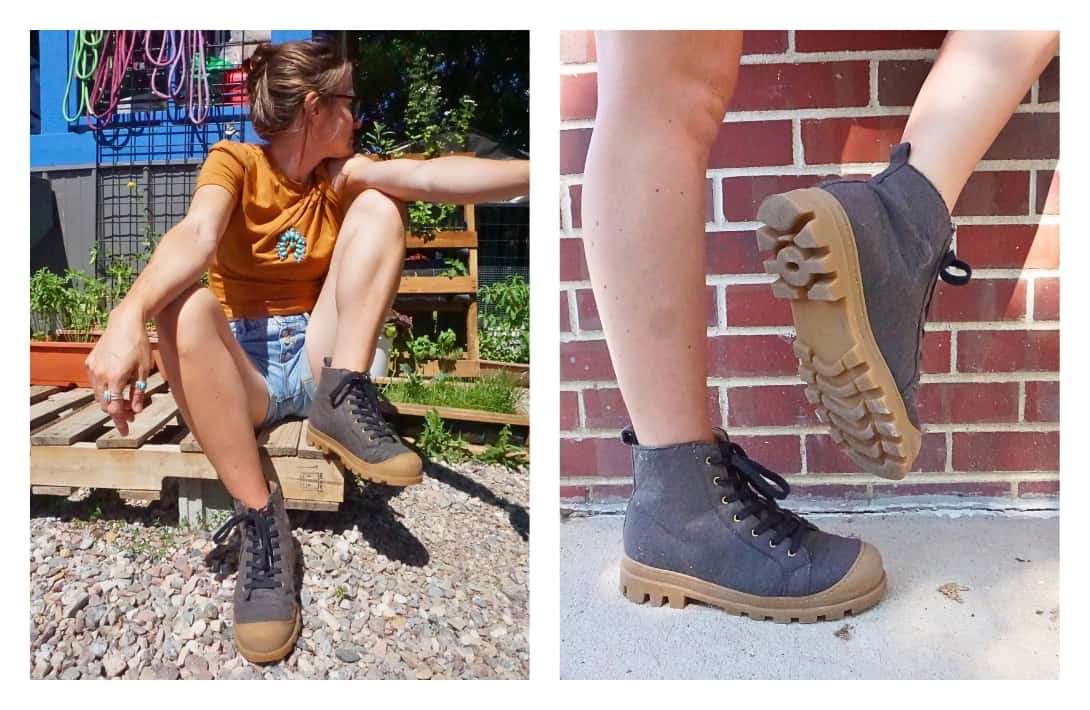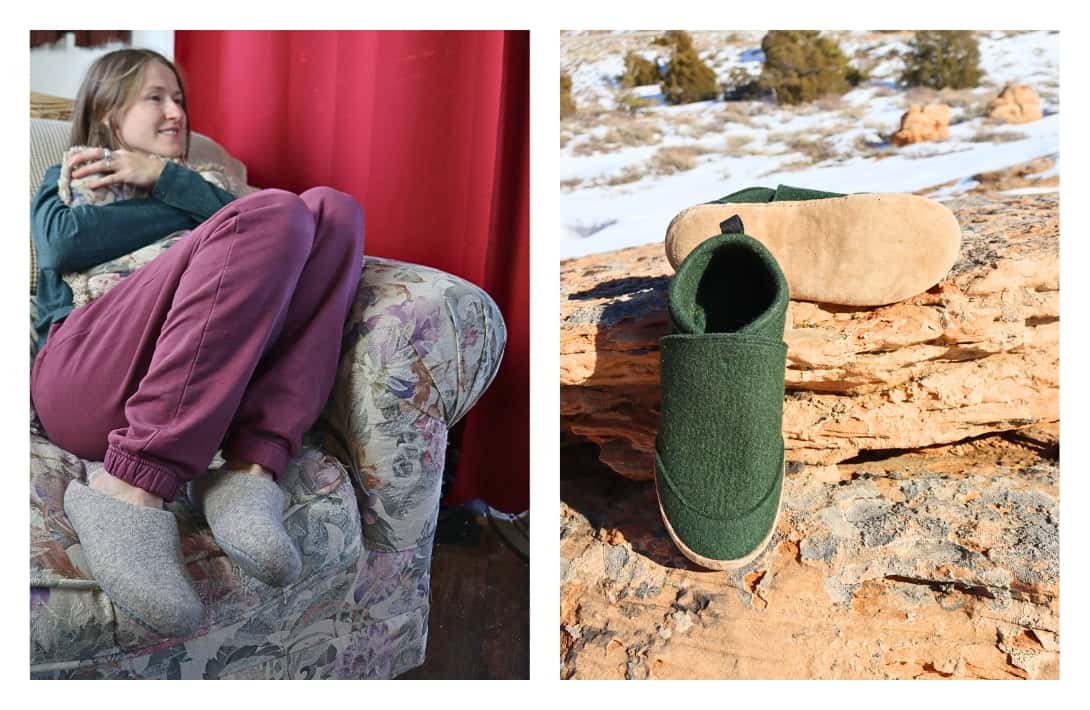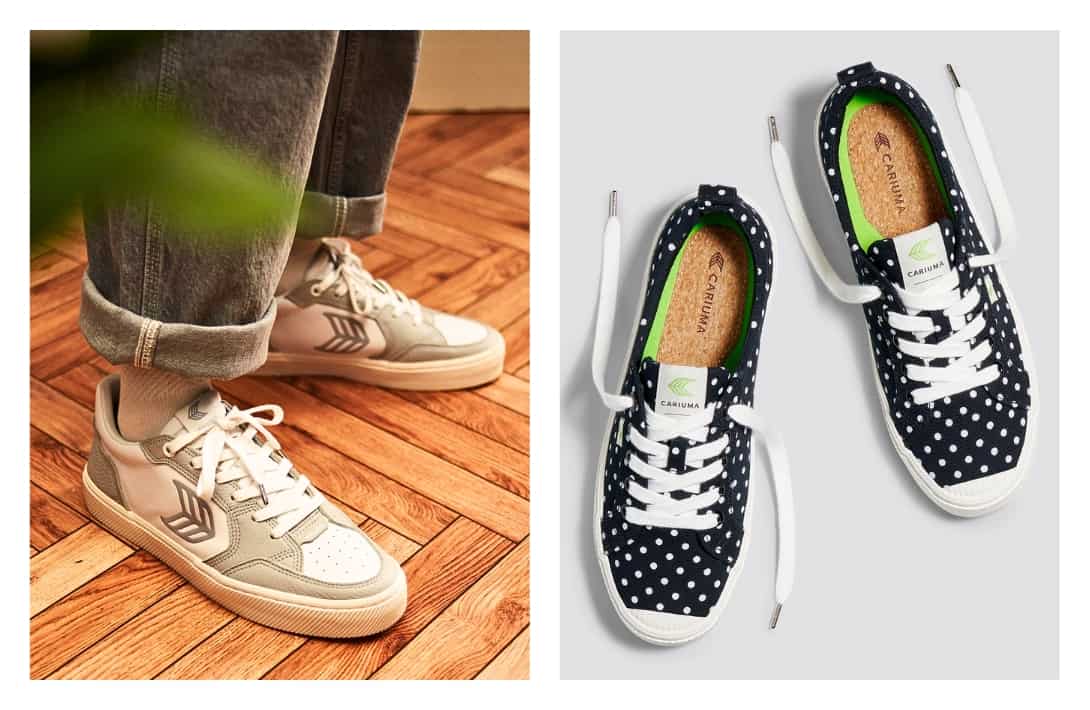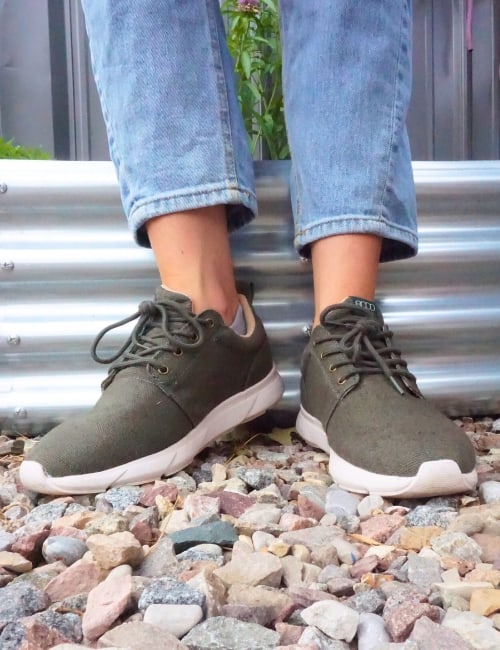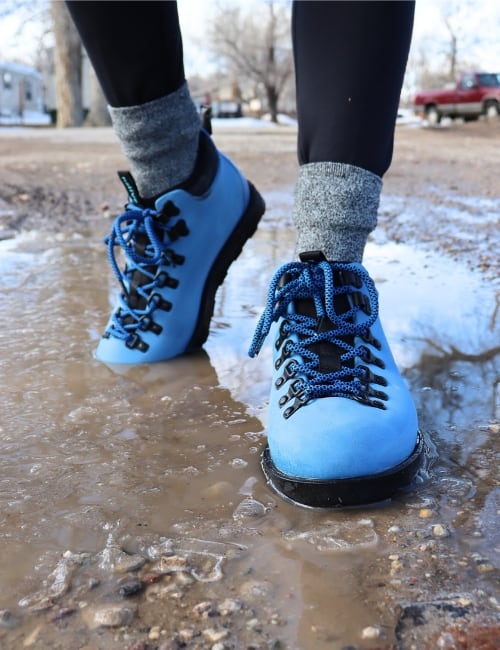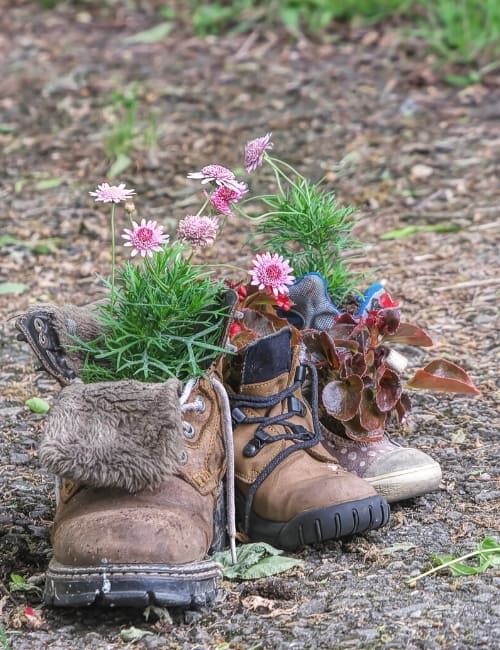9 Ethical Shoe Brands To Put Some Sustainable Pep In Your Step
Living sustainably means taking it one step at a time—literally!
But in a world where traditional footwear is anything but light in its eco footprint, it’s no easy feet.
Thankfully, ethical shoe brands are stepping up and filling those big shoes.
Everything we recommend to you on Sustainable Jungle is independently researched and we ask all brands to confirm their claims. To avoid waste, we test products on an as needed basis. This post contains affiliate links. If you buy something through our links, we may earn a small commission. Learn more about why we do this here.
Kick It Sustainably With The Best Ethical Shoe Brands
ABLE isn’t just an ethical shoe company; they’re one that’s actively challenging others to follow suit by founding the #LivingWageChallenge and demonstrating top-tier transparency.
Nisolo deserves credit, too, as they co-founded this challenge with ABLE. Their LWG-certified byproduct leather makes for stylish shoes that will last years and years.
Then there’s 8000Kicks, who are helping folks ditch synthetic footwear by making the world’s first hemp shoes.
For more on how they’re doing so, read on, and jump to the bottom for more info on why we consider these the most ethical shoe companies.
The Full List Of Sustainable & Ethical Shoe Brands
- ABLE | Visit Store
- Allbirds | Visit Store
- Nisolo | Visit Store
- 8000Kicks | Visit Store
- Thesus | Visit Store
- Thousand Fell | Visit Store
- NAE | Visit Store
- Kyrgies | Visit Store
- Cariuma | Visit Store
1. ABLE
About ABLE
Price Range: $47–$158
ABLE is a Nashville-based luxury ethical footwear brand invests in women so they can break the cycle of poverty and thrive.
It started with scarves, but now they have a range of clothes, leather bags, jewelry, and ethical women’s shoes—including some of the cutest boots, sustainable flats, heels, and sandals around.
Sneakers also have a place in their online store. If you’re looking for a pair you can wear with a tailored suit, check out the Cady Sneaker, featuring a mix of neutral-colored leather and colorful tweed accents.
ABLE’s Ethical & Sustainability Practices
Materials:
Common materials include microsuede (AKA polyester), TPR (a mixture of rubber and plastic), cotton (for laces), and cow leather.
To ensure theirs are ethical leather shoes, ABLE also only uses leather that’s a byproduct of the meat industry and produced using less energy than vegan leather.
They no longer use Napa leather in any shoes, which we’re happy to see because it can come from less-than-ethical sources.
Supply chain & labor practices:
Intending to end the cycles of poverty in the fashion industry, ABLE realized transparency and accountability were the only way forward—and thus became the first fashion brand to publish their lowest-paid wages
The company also bares all in terms of benefits, equality, child labor, forced labor, workers’ rights, and more. You can also see where every ethical shoe has been made in the product description.
Carbon commitments & green practices:
They repurpose shipping boxes and are in the process of transitioning from poly bags to cloth dust bags. Footwear comes in FSC-certified packaging.
They mitigate the impact of leather tanning by only working with tanneries that use clean water practices.
2. Allbirds
About Allbirds
Price Range: $125–$135
As a Certified B Corp that makes some of the most comfortable ethical shoes for women, men, and kids alike, it’s no surprise that Allbirds has shot to a cult-pop ethical shoe status.
Allbirds was founded by American renewables expert Joey Zwillinger and New Zealander Tim Brown, so they know a thing or two about how to keep your footprint lighter.
One of the lightest (and lowest carbon footprint) products is the range of SuperLight Tree Runners, featuring a super breathable knit eucalyptus fiber upper and form-fitting cut.
Aside from sneakers and running shoes, they also sell more casual styles and slippers.
Allbird’s Ethical & Sustainability Practices
Material:
Allbirds shoes are made with four materials: wool, tree, sugar, or Trino™.
The wool shoes are made of ZQ Merino ethically sourced wool, and require 60% less energy to manufacture than synthetic shoes.
Their tree shoes use TENCEL™ lyocell grown with 95% less water and produced in a clean, closed-loop process.
Combining the two, Trino™ is a soft and breathable fiber that naturally reduces odor.
They maximize the use of recycled content, replacing synthetics with recycled plastic bottle laces, bio-based TPU eyelets, and partial castor bean oil midsoles (with some EVA).
Allbirds is also transitioning to using carbon-negative SweetFoam™ (a Proforest-certified material made from sustainably sourced Brazilian sugarcane) for the outsoles. They use byproducts to power the mill and fertilize the sugarcane field.
Supply chain & labor practices:
They ethically source all merino from New Zealand using stringent animal welfare standards, and the wool is also mulesing-free. It’s spun in Milan, Italy in Europe’s only certified sustainable wool mill.
The lyocell is made from FSC-certified eucalyptus sourced from rainfall-fed South African farms.
Shoes are cobbled in a handful of WRAP-certified factories in South Korea, Vietnam, and China.
Carbon commitments & green practices:
In terms of Allbirds sustainability, they went Carbon Neutral in 2019, and purchases offsets for the full gamut of their business operations.
They ship using 90% recycled cardboard packaging.
Community & charitable giving:
Allbirds partners with Soles4Souls to donate lightly used or returned shoes to communities in need.
3. Nisolo
About Nisolo
Price Range: $50–$253
Nashville’s Nisolo is all about ethically-made, intentionally designed, and fairly-priced products.
That includes belts, sustainable bags, and oh-so-many ethical leather shoes for both men and women, in styles like boots, chukkas, sneakers, slip-ons, eco-friendly sandals, mules, and oxfords.
If you’re looking for all-occasion, all-day footwear, the Ana Heeled Chelsea Boot is a personal favorite of ours.
We’ve been wearing a pair of these smooth-grain stylish boots for a year now, and love not only the all-day wearable comfort and stability of the thick, chunky wooden heel, but how durable they’ve proven to be over extensive wear.
The style is super versatile, and we use them both when we need ethical dress shoes and for casual errand running.
Nisolo’s Ethical & Sustainability Practices
Materials:
Sustainable and plastic-free shoes are hard to find, but Nisolo meets those needs.
The standard combination of byproduct leather and natural rubber is what you’ll find in most of Nisolo’s shoes, sometimes with wooden accents
Many of the tanneries they work with are LWG-certified.
Supply chain & labor practices:
This Certified B Corp operates their own Peruvian factory that is third-party audited, employs local artisans, and provides above-fair wages.
They also provide other further financial support, such as assistance with home loans. Their workers are supported further with additional training and classes on finance, nutrition, English, and even yoga.
Outside of Peru, they work with independent artisans in Kenya and factories in Mexico, all of which adhere to a strict Code of Conduct and pay higher than living wages.
They co-founded the #LowestWageChallenge with ABLE to get other brands to challenge the status quo.
Carbon commitments & green practices:
They use carbon offset programs to reduce their emissions by supporting the Amazon rainforest-based projects.
Not only are these ethically-made shoes, but durable shoes made to last—and we can attest to their durability!
Community & charitable giving:
Nisolo’s Shoe Reclamation Program sends returned or damaged goods to the organization Soles4Shoes.
4. 8000Kicks
About 8000Kicks
Price Range: $75–$1,000
8000Kicks is the Portugal-based brand who made the world’s first hemp-based shoe.
Before we brag about some of the world’s most unique ethical natural shoes, we’ve got to provide a quick disclaimer: with just 0.3% THC, these shoes aren’t for smoking and they won’t cause any trouble on your next flight.
We love kicking it in the Explorer V2, which is an incredibly lightweight all-around sneaker. It has enough cushion for us to take it on a morning jog, while still being understated and neutral enough in appearance to pair with more casual outfits.
8000Kicks’ Ethical & Sustainability Practices
Materials:
We’re big fans of hemp fabric. It’s sustainably grown without many inputs, is extremely durable, and can still compost in your backyard.
These sustainable vegan shoes use another material, too—Bloom algae, which helps clean waterways impacted by algal blooms (caused by nutrient leaching and fertilizer runoff).
Supply chain & labor practices:
8000Kicks source hemp in countries like Romania, China, and France before the shoes are produced in China and Portugal. They are also keen on transparency and told us they’d be happy to share specific details about their factories (watch this space).
Their Portuguese factory provides free education and health care to its workers.
Carbon commitments & green practices:
To reduce shipping emissions, the brand now ships directly from warehouses in the US and the UK.
The company’s Portuguese factory uses 45–55% renewable energy sources, while the China factory uses 30–40%.
5. Thesus
About Thesus
Price Range: $163–$266
With some of the most ethical shoes Canada offers, Thesus—formerly known as Alice + Whittles, is a woman and POC-owned brand that wants us to all #BeOutside.
They’re proud of creating sustainable rain boots for the outdoors, rain, and riding.
For warmer months, The Terrus is made from 98% recycled plastic and has a molded cork footbed.
Thesus’ Ethical & Sustainability Practices
Materials:
Thesus gets two toes up for their use of repurposed marine plastic, recycled synthetic wool, recycled rubber, recycled leather (from unlikely sources like car seats), and fairly traded and sustainably sourced rubber (certified by the Fair Rubber Association).
They even use eco-friendly vegan glue and recycled plastic laces.
Supply chain & labor practices:
To find the best of the best in the manufacturing world, Thesus traveled the globe. Since 2022, 100% of production has moved to Portugal.
They’ve also taken some time to connect with the communities in which their factories are located and regularly audit most of their supply chain.
Carbon commitments & green practices:
Currently, 90% of their materials are sustainable and traceable but they won’t put their feet up until it’s 100%.
6. Thousand Fell
About Thousand Fell
Price Range: $125–$135
Thousand Fell creates sneakers with a life cycle you can follow.
And then return for recycling and earn recycling credits you can use towards your next Thousand Fell purchase.
The company has created a range of vegan ethical shoes for both sexes, in a range of colors, with or without laces.
They’re stain and odor-resistant, with the aloe vera liner providing sockless freedom and breathable comfort.
A water-resistant quartz coating added to the slip-on range increases durability further, which makes these some of our favorite skate-style shoes we’ve ever tested.
They tick all our boxes: comfortable, versatile (in both style and performance), durable, and of course, we feel better wearing them knowing that when they wear out, we can send them somewhere to be recycled.
Thousand Fell’s Ethical & Sustainability Practices
Materials:
The uppers are vegan bio-leather, made from rPET and corn waste resin. The outsoles are made from sustainably Amazonian rubber and eschew synthetic fillers. While the insoles are a bio-foam made from soybean oil, a renewable source.
Thousand Fell has replaced other traditional plastic components in footwear with locally sourced sugar cane, coconut husk, or palm fibers.
Even the laces are made from recycled PET.
Supply chain & labor practices:
These ethically-made shoes come from a family-owned factory in Brazil. They source as many local ingredients as possible including food waste component parts.
Carbon commitments & green practices:
Customers in NYC receive their order via bike messengers from local micro warehouses. Tissue paper and single-use plastics have been removed from all packaging.
A partnership with Justa Trama, a nonprofit in Brazil, means sneakers arrive in an organic cotton tote bag. To cut down on cardboard, the shoe box doubles as a shipping box and is made using recyclable, FSC-certified cardboard.
A fully recycled shoe brand, shoes returned to Thousand Fell under their Recycle & Earn scheme are either broken down into their component parts for recycling or composting.
Community & charitable giving:
Any returned sneakers and slides still in good shape get a second life with the help of Soles4Souls.
Thousand Fell is also a member of 1% For The Planet, helping to fund projects and nonprofits that give back to the environment.
7. NAE
About NAE
Price Range: $39–$248
NAE stands for No Animal Exploitation and if you’re looking for ethically-sourced shoes, this is a good place to start.
This Portugal-based and PETA-approved footwear company has a beautiful selection of vegan sandals, slides, wedges, sneakers, boots, and pumps.
Despite the cute styles, they are incredibly comfortable and functional. We personally tried the High-Top Lace-Up Boot, with the recycled PET upper.
Back when we worked all day in a coffee shop, these became our favorite work shoes because we could wear them for 10 hours on our feet on tile floors without experiencing ANY foot fatigue and leg pain.
Plus, the lugged soles are super grippy, making them perfect for everything for slippery kitchen floors and varied types of outdoor terrain alike.
NAE’s Ethical & Sustainability Practices
Materials:
Here’s what you might be stomping around in: Piñatex (vegan leather made from pineapple leaves blended with PLA), cork, recycled PET, organic cotton, and vegan leather (a microfiber mix of cotton, polyester and nylon, recycled whenever possible).
These main outer materials are combined with things like OEKO-TEX-certified polyurethane lining, recycled polyester laces, natural cork footbeds, and recycled car tires.
Supply chain & labor practices:
NAE only works with European-certified factories in Portugal that demonstrate respect for their employees and use practices that don’t damage the environment.
Carbon commitments & green practices:
NAE uses a carbon-neutral manufacturing process and minimizes their chemical and water consumption.
Inclusivity:
Inclusivity generally isn’t a big deal when it comes to footwear, but NAE actually has a range of unisex shoes. Gender-neutral fashion is the future.
Community & charitable giving:
They also partner with the ReMove Project, which is how they source the ocean plastic waste that gets turned into recycled PET.
8. KYRGIES
About Kyrgies
Price Range: $70–$105
Kyrgies, a Virginia-based slipper maker, wants us to all “embark on the great indoors”—though they also make shoes for the outdoors too.
We own a pair of their indoor sustainable slippers, as well as the more versatile Tengries, whose naturally-tanned leather leather outsole sole means they’re suitable for indoor and outdoor use. We mostly use ours around the yard—like going to get the mail and puttering in the garden.
They are light and comfortable, and the body and insole wool keeps them smelling fresh even after months of wearing them all day around the house.
They come in all sizes, from big papa to itty bitty baby so they’re a go-to ethical shoe brand for kids.
Kyrgies’ Ethical & Sustainability Practices
Materials:
All shoes feature felted wool, which is processed with natural soap and dyed with low-impact dyes.
The Naturals and Tengries, have natural leather soles to tolerate outdoor conditions (but will last much longer if you keep them out of water), whereas the walkabout have a vulcanized milk of rubber sole making them water-safe.
It’s processed without chromium and chrome. However, like all leather (even sustainably tanned leather) it’s not as readily biodegradable as the wool, so should be removed before composting.
Supply chain & labor practices:
Kyrgies sources their wool from free-range sheep in Kyrgyzstan, where it’s also felted and carded in a factory that respects and utilizes traditional craftsmanship.
Kyrgies is committed to providing gainful employment opportunities to people in communities where options are few, thus their craftspeople are mostly women.
We don’t know where the leather comes from, so we will be reaching out to confirm.
Carbon commitments & green practices:
This brand ensures “not one gram of wool is wasted.” Any wool that doesn’t make it into their slippers is reprocessed and used for residential insulation.
Kyrgies offsets all carbon emissions by supporting renewable energy or carbon removal projects. Their goal is to become Carbon Neutral Certified.
Community & charitable giving:
A member of 1% for the Planet, they contribute to One Tree Planted.
9. Cariuma
About Cariuma
Price Range: $85–$159
Cariuma creates casually cool, ethical skate shoes that are a favorite with celebrities, including the iconic Helen Mirren.
Crafted from recycled plastic bottles and various earth-sourced materials, choose between classic lace-up sneakers, slip-ons, high tops, low tops, skateboarding shoes, and limited-release collaborations.
Not everything is 100% vegan, but the Black Polka Dots Canvas OCA Low sneakers (polka) dot the Is and cross the Ts.
If polka dots aren’t your thing, you can also choose any variety of solids or other patterns like leopard and zebra print.
Cariuma’s Ethical & Sustainability Practices
Materials:
Cariuma uses organic cotton grown using regenerative methods, rubber harvested through ethical “tapping”, bamboo, sugarcane, cork, and mamona oil (a plant-based and organic alternative to petroleum).
Water-resistant GRS-certified recycled nylon and recycled PET is used in uppers, laces, labels, and thread.
Any leather and suede materials used are sourced from LWG Gold-Rated suppliers.
Supply chain & labor practices:
As a Certified B Corp, Cariuma ensures factory workers make a comfortable, living wage and adhere to a manageable work week to ensure a healthy work/life balance.
Carbon commitments & green practices:
Shoe boxes double as a shipping box and to cushion their sustainable sneakers, Cariuma uses 100% recycled and recyclable FSC-certified paper.
Any color in the packaging comes from soy-based ink.
Carium’s warehouse is a solar-powered, air-conditioned facility, equipped with energy-efficient LED lighting and a cooling tower to prevent and monitor over-consumption.
Community & charitable giving:
Carium is doing their part to rebuild rainforests and to date has planted over two million trees. Two trees are planted per pair purchased.
Did you know we Have a Newsletter?
We cover the latest in sustainable living, fashion, zero waste, beauty, travel, finance and more…
How We Found The Best Environmentally Friendly Shoes
So, how did we determine which shoe brands were ethical enough to make the cut?
Our sustainable fashion criteria, of course. The four major social and environmental ethical shoe specs we scrutinize include:
Materials:
A garment’s biggest impact comes from material (because it impacts the environment at sourcing, production, and end-of-life levels) so this is a priority.
- Certifications: Forest Stewardship Council (FSC), ZQ Merino, Leather Working Group (LWG), OEKO-TEX, Global Organic Textile Standard (GOTS), Global Recycle Standard (GRS), Proforest, Fair Rubber Association
Supply chain & labor practices:
This refers to the human rights side of the industry. Ethical companies need to provide transparency and traceability of all entities responsible for making their shoes.
Because of doubts cast by greenwashing, we look to third-party auditors and certifications, like ethical Fair Trade shoe brands.
- Certifications: B Corporation (B Corp), Worldwide Responsible Accredited Production (WRAP), fair trade
Carbon commitments & green practices:
These include purchasing offsets from (hopefully) some of the best carbon offset programs, product recycling programs, low-waste shipping, and packaging materials, using renewable and resource-conservative production methods, and creating lasting designs.
Community & charitable giving:
We love to see companies that work to make the world a better place by contributing either time or funding to social and environmental causes.
Final Thoughts On Ethical Footwear Brands
As one of the most polluting industries in the world, fashion needs a major reform.
What better place to start making those reforms than from the ground up—like with a pair of sustainable and ethical shoes?!
There’s nothing wrong with loving some shoe shopping therapy, as long as we’re still loving the earth and those making our sustainable shoes.
Help us promote those brands who are changing the ethical footwear game by sharing their article with any footwear fiends in your life.
Pin these:
